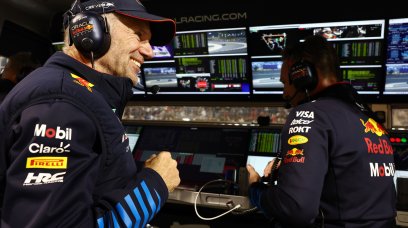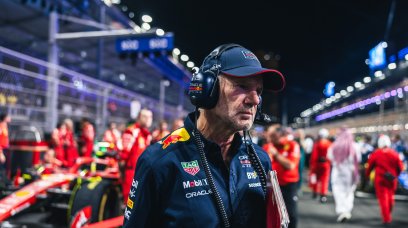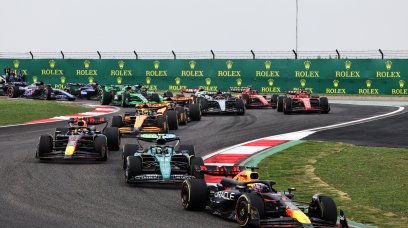After two years of Covid-driven chaos, 2022 was the year that saw Formula 1 return to (semi)-normality. I say "semi" as the year opened to a continuation of mask-wearing across the paddock and bans on media in team hospitalities except by invitation. Plus, it was a given that one or two races would be cancelled as host countries such as China persisted with travel restrictions. The year was, of course, the first in over a decade under a new FIA President - Emirati Mohammed Ben Sulayem - who obviously pursued a different path to that of predecessor Jean Todt. Indeed, that became clear when the FIA released its report into the fiasco that was Abu Dhabi 2021 - a debacle inherited from the previous regime – and MBS’s refusal to be pushed by F1 into signing off a doubling in sprint races to six. However, the biggest change by some distance was to F1’s regulations: primarily Technical and Sporting, although the effects of the Financial Regulations introduced in 2021 would impact on the season - particularly as 2022 would be the year of reckoning after the first season under the budget cap of the (broadly) $145m permitted for race team operations but excluding driver salaries and non-racing activities.
One reason so many were affected by porpoising
That 2022’s cars were different beasts was clear from the moment they hit the track in Montmelo for ‘pre-season shakedown’ ahead of pre-season testing and the opening race, both in Bahrain. In the blunt words of one technical director they "bounce about like a f***ing kangaroo" due to 'porpoising', a term borrowed from early-1980s F1-speak when the phenomenon caused by a sudden loss of ground effect reared its head. Which begged the question: If porpoising was a known side-effect of ground effect cars – which are ‘sucked’ to the track via venturi-shaped floors rather than being forced down by airflow over the bodywork - why were no red flags raised when the new ground effect regulations were framed? The reason is clear: Many current designers were still in primary school during the 1980s - some of their number admitting they were not even aware of the phenomenon. It can be no coincidence then that 2022’s stand-out cars, namely the Red Bull RB18 and Ferrari F1-75, were designed by engineering teams led by respectively Adrian Newey and Rory Byrne, who had been involved in F1 design during the early eighties. If porpoising initially tarnished the much-vaunted 'new era' regulations - with Mercedes conspicuously paying the price to the very end - a switch to 18-inch Pirelli rubber certainly paid dividends. A combination of better 'following car' aerodynamics facilitated by ground effects and more durable tyres saw the number of overtakes during the season increase from 2021’s 500-odd to over 700, an approximate 50% bump. That said, the promised reshuffling of teams failed to eventuate: the top three still ruled the roost, with the only change being that Mercedes slipped to third while Red Bull and Ferrari each moved up a slot. This trio locked out all podiums save one: Imola, where Charles Leclerc’s spin in the closing stages elevated Lando Norris (McLaren) to third. Note: 2021 saw five podiums claimed by drivers from outside the top three teams.
Changes sporting weekend
The biggest change on the sporting front was a switch to three-day weekend formats - despite cautions that such a move would result in reduced weekend media coverage as too many media sessions would be crammed into three days. Once realisation hit, restrictions on Thursday activities were eased until it was back to ‘normal’ - but, crucially, the media collectively lost thousands through travel re-bookings. As the year progressed, whatever Covid restrictions remained were lifted. Two hangovers remained, though: hybrid live/video media sessions for FIA conferences, and the 'mixed zone' interview concept, which has drivers paraded past media for a couple of minutes each rather than our flocking to hospitality units for longer sessions. Teams love the MZ concept because they move drivers on when things get hot… That said, throughout Covid, the dedicated F1 media collectively did a great job of reporting on the sport under difficult circumstances, but now that things are moving in the right direction let us hope F1 (and its teams) drop all Covid charades and returns to proper scheduled in-person media sessions that enable us to again bring to you, our readers, in-depth coverage directly from the circuits of the world. You deserve it.
Controversy off the track
Formula 1 and controversies are synonymous, and 2022 was no different: Forget the Abu Dhabi hangover - that was cleared up as best the new administration could – and focus on the season’s four contentious issues. The relationship previously enjoyed by (interim) Secretary-General for Sport Shaila-Ann Rao with Mercedes as in-house counsel; the Contract Recognition Board’s ruling that Oscar Piastri was a free agent for 2023; the 'resignation' of Ferrari team boss Mattia Binotto; and, finally, the biggest controversy of the year, namely findings by Cost Cap Administration that Williams, Red Bull and Aston Martin breached 2021’s budget cap. The first issue: After the November announcement that Rao was leaving the FIA we analysed the situation and concluded: "In six short months, Rao had become the story, which in turn became a major distraction for the FIA. When that happens, the result is inevitable…" Piastrigate was about farcical as it gets: Despite knowing it did not hold a valid contract with the Australian coming man for 2023 - as its in-house lawyer admitted - Alpine contested his signing by McLaren via the CRB, eventually being saddled with a $1m costs order. RacingNews 365 uniquely had sight of the verdict and, were the verdict not so serious, Alpine’s action would be utterly laughable. Even with the benefit of six weeks’ hindsight Binotto’s departure remains unfathomable: As outlined here , the Swiss-Italian engineer achieved every target set for him by company Chairman John Elkann yet was placed in an untenable position. This led to his resignation from the company he served with distinction for 28 years. True, Ferrari’s strategies left much to be desired even at the best of times and Binotto should have taken more robust action. Still, throwing baby out with the bathwater will not solve Ferrari’s deep-rooted penchant for self-destruction. Forget not that it is 14 years since Ferrari won a drivers’ title – and goes into 2023 with its fifth team boss in that time. Red Bull has had one team principal in that time, yet won 11 titles…
Breaching the cost cap and F1's future
Talking of Red Bull, in my opinion the team’s breach of the cost cap is best compared to a racing incident: No one sets out to crash, but when one pushes to the absolute limit it is inevitable that one occasionally goes beyond it. The irony is that no crash results in $7m worth of damage – the amount the $1.8m breach ultimately cost the team in fines and costs. As exclusively revealed here , the team’s total overspend initially ran to $5.6m which was reduced to $1.8m after deduction of some ‘grey’ spends. Thus, the fine ran to four times the overspend, plus the team forfeits 10% of its aerodynamic testing allowance for 12 months! However, speaking exclusively to RacingNews365, F1’s (outgoing) Managing Director Ross Brawn deemed the cap a "huge success", saying: "I think the budget cap is a huge success thanks to the fact that it’s regulated within the FIA’s system. "We made an attempt at it 10-15 years ago but that was an agreement between teams, which is very difficult to make stick. We've seen with the issues we had this year with Red Bull and Aston Martin - if it wasn’t for the regulatory process, we would have struggled. "The hiccups we've had were predictable, but they're not severe. The teams now know where the limit is, they know the consequences of breaching the budget cap, both in terms of penalties and adverse publicity. "Nobody wants to be seen to be breaching the cap in future, so it's a huge success." Which brings us to my take on 2022: Very good in parts, but still some way off the sport’s full potential, on and off-track. True, key ratings - be they live attendances or TV audiences, number of sponsors or overall team revenues - are going in the right direction. On the flipside, fans discovered that costs of experiencing F1 live or on TV have risen exponentially year-on-year, so one wonders if/when the bubble will burst…
Most read



















